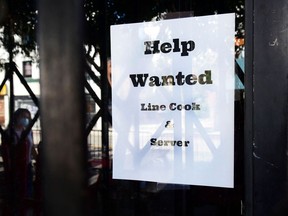
According to Statistics Canada, there were 111,000 temporary foreign workers (TFWs) in Canada in the year 2000. By 2021, this number had ballooned to 777,000.
In 2019, TFWs made up four per cent of all workers with T4 earnings – nearly 1 in 20
From 2010 to 2019, TFWs became increasingly concentrated in three low-paying sectors: accommodation and food services, retail, and “administrative and support, waste management and remediation services”. While these are fine jobs, they are low-paying positions unrelated to critical infrastructure like electricity grids, transporation, or health care. In fact, the share of TFWs working in agriculture, health care and social assistance, educational services, and construction declined from 2010 to 2019.
An increasing proportion of TFWs are working at fast food counters and in hotel lobbies.
Perhaps the most well-known instance of this is our national coffee icon Tim Hortons, which has been at the centre of a number of controversies surrounding its extensive use of the TWF program. Most recently, D.P. Murphy Inc, which operates Tim Hortons restaurants across Prince Edward Island, found itself in hot water when it bought an apartment building in the small seaside town of Souris – and promptly evicted the tenants to make way for TFWs.
Tim Hortons has also been the subject of complaints about working conditions for TFWs, such as the case in 2012 when Mexican workers at a northern B.C. Tim Hortons were required to pay rent twice a month, for bunk beds in the crowded rooms of houses owned by the franchisee.
An insightful Maclean’s piece from 2014 argues that Tim Hortons relies on importing TFWs to prop up a common restaurant chain strategy: padding poor sales figures by continually opening more and more stores. In one quarter in 2014, Tim Hortons same-store sales grew by just 1.6 per cent, but the company posted an overall sales growth of five per cent – because it opened 160-odd new stores over the previous year!
Companies pursuing this endless expansion strategy, or simply looking for cheap labour, are aided by an underreported TFW stream: the International Mobility Program (IMP). The government website Canada.ca advertises the IMP succinctly: “Hire a worker without a Labour Market Impact Assessment (LMIA)”. Whereas for the Temporary Foreign Workers Program (TFWP), employers need to at least go through the motions of trying to hire a Canadian, the IMP temporary worker stream bypasses this requirement entirely.
IMP work permits have doubled from 2017 to more than 470,000 last year, which does not include the 200,000 international students who hold IMP permits. This program is a big contributor to the astronomic growth in temporary foreign worker numbers, and the shift in the proportion of foreign workers towards jobs in food, accommodations, retail, and administrative support.
Immigration Minister Marc Miller has stated he is willing to “rein in” the number of temporary foreign workers in 2024. Miller’s reforms should be guided by two objectives: reducing TFW numbers, and shifting the proportion away from the service sector.
Allowing the number of TFWs to rise to an astounding 777,000 has contributed to Canada’s growing housing crisis – that’s simply the law of supply and demand. Imposing a cap of 50,000 or less would considerably reduce the strain on housing.
Allowing Tim Hortons or Days Inn to staff their workforces with foreign nationals is enabling the unhealthy corporate strategy of endless franchise expansion, and is contributing to wage stagnation in the service sector.
The simplest way to reverse this trend would be to abolish the International Mobility Program (IMP), and strengthen the Labour Market Impact Assessment (LMIA) across the board.
If kicking Canada’s addiction to cheap overseas labour means a tad fewer Timmies, is that such a price to pay?
